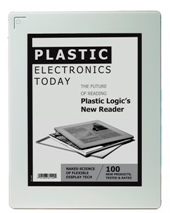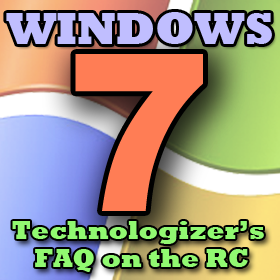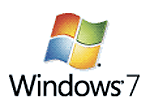 Here’s what I’m reading today:
Here’s what I’m reading today:
Will Pre multitasking work well?
South Carolina goes after Craigslist.
The prehistory of today’s Internet.
Windows 7’s XP compatibility: incompatible!
 Here’s what I’m reading today:
Here’s what I’m reading today:
Will Pre multitasking work well?
South Carolina goes after Craigslist.
The prehistory of today’s Internet.
Windows 7’s XP compatibility: incompatible!
 Amazon has unveiled its new, larger Kindle, and it’s pretty much what you’d guess it would be–a device that looks a lot like today’s Kindle 2, with more screen real estate. The Kindle DX has a 9.7-inch screen (that’s twice the space of the 2’s 6 inches), costs $489, and is shipping some time this summer. It’s got the built-in capability to read PDF files, and the larger, 1280-by-824 display means it can show magazine pages without reformatting.
Amazon has unveiled its new, larger Kindle, and it’s pretty much what you’d guess it would be–a device that looks a lot like today’s Kindle 2, with more screen real estate. The Kindle DX has a 9.7-inch screen (that’s twice the space of the 2’s 6 inches), costs $489, and is shipping some time this summer. It’s got the built-in capability to read PDF files, and the larger, 1280-by-824 display means it can show magazine pages without reformatting.
Like an iPhone, the Kindle auto-rotates the display when you flip the device into landscape orientation. And it’s got 3.3GB of available memory, good for storing up to to 3,500 books (the Kindle 2 stores 1,500).
The screen uses the same E-Ink technology as the Kindle 2; Jeff Bezos’s letter repeats Amazon’s mantra that it “looks and reads like real paper,” and says that text and images are “amazingly sharp.” But even though the DX will be able to show photos and other art at a comfortable large size, E-Ink’s sixteen shades of gray will have trouble making anything that was originally in color look “amazing.”
Besides the newspapers and magazines that are already available in Kindle format, a bunch of textbook publishers have signed on to produce tomes for the new Kindle, and several colleges say they’ll distribute Amazon’s new gadget to students. Sounds good to me: I still wince when I remember lugging my backpack full of books, and wince even more when I recall how absurdly expensive many textbooks were.
And here’s something a little weird: If you sign up for a long-term subscription to the New York Times, the Boston Globe, or the Washington Post, you can get a discount off the DX’s somewhat intimidating pricetag–but only people who live in areas where they can’t get home delivery of the dead-tree versions of the papers qualify. Sorry, tech-savvy locals!
 The Kindle DX would seem to be a great big Amazonian shot across the bow of Plastic Logic’s similar reader. Plastic Logic announced its device last September, but doesn’t plan to ship it until early 2010, which gave Amazon plenty of time to steal some of its thunder. It too has a big E-Ink screen and PDF capability (as well as support for Microsoft Office and other formats); it uses a touchscreen instead of buttons and a keyboard, and has Wi-Fi instead of the Kindle’s EVDO. It’s still an intriguing device, and I don’t think it’s aiming at precisely the same audience as the Kindle DX–Plastic Logic envisions businesspeople loading up their reader with Word documents and PowerPoints. But it’ll be the second one in its category when it shows up, not the first. I wonder if Amazon would have come up with the DX if it didn’t know that the Plastic Logic device was in the works?
The Kindle DX would seem to be a great big Amazonian shot across the bow of Plastic Logic’s similar reader. Plastic Logic announced its device last September, but doesn’t plan to ship it until early 2010, which gave Amazon plenty of time to steal some of its thunder. It too has a big E-Ink screen and PDF capability (as well as support for Microsoft Office and other formats); it uses a touchscreen instead of buttons and a keyboard, and has Wi-Fi instead of the Kindle’s EVDO. It’s still an intriguing device, and I don’t think it’s aiming at precisely the same audience as the Kindle DX–Plastic Logic envisions businesspeople loading up their reader with Word documents and PowerPoints. But it’ll be the second one in its category when it shows up, not the first. I wonder if Amazon would have come up with the DX if it didn’t know that the Plastic Logic device was in the works?
 When Apple’s FileMaker division told me that it had iPhone-related news, my first guess was that it was announcing a version of its flagship cross-platform database application for its parent company’s phone. Not quite. It released a database for the iPhone yesterday, but that database is Bento, a $4.99 mobile version of the company’s consumer and small-business database application, which until now has run only on Macs with OS X 10.5 Leopard.
When Apple’s FileMaker division told me that it had iPhone-related news, my first guess was that it was announcing a version of its flagship cross-platform database application for its parent company’s phone. Not quite. It released a database for the iPhone yesterday, but that database is Bento, a $4.99 mobile version of the company’s consumer and small-business database application, which until now has run only on Macs with OS X 10.5 Leopard.
Bento for the iPhone (and iPod Touch) isn’t the first database for the iPhone, but it may be the most thoroughly Apple-esque one to date. (Which makes sense.) A cover-flow like browser lets you choose from dozens of templates, like the ones you get in Bento for the Mac–everything from an equipment log to a digital media collection to expenses to notes to a record of your diet. There’s also a blank template. Once you choose a template and create a database–which Bento calls a Library–you can customize the fields and their order, then populate them with information.
On the Mac, Bento’s biggest distinguishing characteristic is its pretty, flexible layouts. On the iPhone, sensibly enough, everything’s organized into the typical iPhone list-like format. It’s less flashy but makes good use of the available real estate, and it’s easy to browse records, update old ones, and add new information.
…in Windows NT, 2000, XP and Vista, Explorer used to Hide extensions for known file types. And virus writers used this “feature” to make people mistake executables for stuff such as document files.
The trick was to rename VIRUS.EXE to VIRUS.TXT.EXE or VIRUS.JPG.EXE, and Windows would hide the .EXE part of the filename.
Additionally, virus writers would change the icon inside the executable to look like the icon of a text file or an image, and everybody would be fooled.
Surely this won’t work in Windows 7.
As a grizzled old Windows veteran, I remember the days when computer users spent a lot more time thinking about extensions (and we liked it, dagnab it!). It was kind of discombobulating when Microsoft began downplaying them. But Mikko brings up a pretty compelling reason why it’s not a great idea to hide ’em. Wonder if Microsoft has thought about this, and why it hasn’t erred on the side of safety?
Happy Cinco De Mayo, everybody!
Pictures of Amazon’s giant Kindle?
FTC trouble for Google, Apple?
Why Blackberry push Gmail matters.
The biggest cults in technology.
Windows Mobile Marketplace rules established.
 Windows 7 is here–sort of. Yes, Microsoft still isn’t talking about when it’ll ship the final version–all evidence suggests it’ll be sometime this Fall–but the company is unleashing the Windows 7 Release Candidate today. It’s a free, all-but-final version of the operating system, and it’ll work until March 1st, 2010 before Microsoft forces you to uninstall it or overwrite it with a paid-for copy of the final edition. In short, if you’re itching to give Windows 7 a try, you can.
Windows 7 is here–sort of. Yes, Microsoft still isn’t talking about when it’ll ship the final version–all evidence suggests it’ll be sometime this Fall–but the company is unleashing the Windows 7 Release Candidate today. It’s a free, all-but-final version of the operating system, and it’ll work until March 1st, 2010 before Microsoft forces you to uninstall it or overwrite it with a paid-for copy of the final edition. In short, if you’re itching to give Windows 7 a try, you can.
I’ve been using Windows 7 in various prerelease incarnations since last October, and for the more part, I’ve liked what I’ve seen. (So did most of the Technologizer community members who took our survey on the beta.) For the past few days I’ve been running the Release Candidate–mostly on an Asus EeePC 1000HE, and to a lesser extent on a Dell XPS M1330 laptop. (Full disclosure: The latter machine was loaned to me by Microsoft for Windows 7 testing.)
I’ll be writing about this beta a lot in the coming months–right up until the time that I get my hands on a version of W7 that’s even closer to being ready to roll. After the jump, some questions and answers about the Release Candidate and Windows 7 in general.
Continue Reading →
 Owen Thomas of Valleywag has published a rumor which is both wildly entertaining and wildly improbable: Apple is supposedly in negotiations to buy Twitter for $700 million. What’s the alleged rationale? Well, Owen says that Apple is making dough as people snap up Twitter clients for the iPhone from the App Store. But A) it would take a heck of a lot of $2.99 copies of Tweetie to come up with $700 million; and B) as Owen points out, Apple will make money from Twitter clients whether or not it owns Twitter.
Owen Thomas of Valleywag has published a rumor which is both wildly entertaining and wildly improbable: Apple is supposedly in negotiations to buy Twitter for $700 million. What’s the alleged rationale? Well, Owen says that Apple is making dough as people snap up Twitter clients for the iPhone from the App Store. But A) it would take a heck of a lot of $2.99 copies of Tweetie to come up with $700 million; and B) as Owen points out, Apple will make money from Twitter clients whether or not it owns Twitter.
Owen goes on to theorize that Apple might covet Twitter in order to a make a statement about embracing openness and the Web. That seems like a pretty damn remote possibility. Apple does indeed buy companies, but it does so to become more like itself, not less so. (Good example: Its 2008 acquisition of PA-Semi, which will let it design its own chips and therefore gain more control over its products. Better example: Its 1996 acquisition of NeXT, which got it both a powerful OS and a new CEO with an outstanding resume for running Apple.)
People love to talk about Apple buying other famous companies. Sometimes they say that deals are in the works (although I wonder if any of the rumored transactions even reached the talking-it-over stage). Other times, they just wistfully hope that a deal might happen, or wonder what would transpire if it did.
Let’s review a dozen examples, shall we? After the jump, that is.
 It’s not all that often that the words “Windows” and “ahead of schedule” can be used in the same sentence, but here we go: As Cnet’s Ina Fried is reporting, Microsoft. which said it was going to make the Windows 7 Release Candidate available for download tomorrow, opened up the floodgates tonight, ahead of schedule. Here’s the download page. I’ll be posting a detailed guide soon, but here’s the short story: I’ve been using the Release Candidate for a few days and it’s gone–well, not perfectly, but really well. Even though Windows 7’s final version isn’t due for months, I hope and expect that the Release Candidate is the version of Windows I’ll turn to most often from here on out.
It’s not all that often that the words “Windows” and “ahead of schedule” can be used in the same sentence, but here we go: As Cnet’s Ina Fried is reporting, Microsoft. which said it was going to make the Windows 7 Release Candidate available for download tomorrow, opened up the floodgates tonight, ahead of schedule. Here’s the download page. I’ll be posting a detailed guide soon, but here’s the short story: I’ve been using the Release Candidate for a few days and it’s gone–well, not perfectly, but really well. Even though Windows 7’s final version isn’t due for months, I hope and expect that the Release Candidate is the version of Windows I’ll turn to most often from here on out.
If you’re intrigued enough by the Release Candidate to consider trying it, I say go for it–as long as you can install it in its own partition, rather than overwriting a working copy of Windows Vista. (Unless you’re really anxious, though, waiting a day or two’s not a bad idea, given Microsoft’s history of struggling to keep up with the initial throngs of crazed downloaders.)
If you spend time with the RC, please let us know what you think. And stay tuned for more thoughts from me.
 It’s been seven months now since Google released its Chrome browser for Windows and said that versions for OS X and Linux were in the works. In the time since then, Chrome has become the browser I turn to first when I’m using Windows. And when I’m using a Mac? Well, I spend a fair amount of time brooding about the absence of Chrome, not to mention the absence of any reliable information on when it might show up.
It’s been seven months now since Google released its Chrome browser for Windows and said that versions for OS X and Linux were in the works. In the time since then, Chrome has become the browser I turn to first when I’m using Windows. And when I’m using a Mac? Well, I spend a fair amount of time brooding about the absence of Chrome, not to mention the absence of any reliable information on when it might show up.
Charles Arthur of the Guardian did more than brood–he downloaded a developer build of Chrome for the Mac, and found it to be a work in progress. And it sounds like a lot more progress has to be made before the browser is ready for mass consumption–many basic features aren’t in place yet.
On one hand, it’s reassuring to know that Chrome for the Mac isn’t in limbo, but I’m now recalibrating my expectations for when it might arrive in a form that anyone’s going to use as a primary browser. I’m thinking it’s going to take months, not weeks, and I’ll be relieved if it’s ready before Chrome for Windows celebrates its first birthday.
 Ars Technica’s Ryan Paul has posted a good piece on an alarming story: The developers of two popular and useful Firefox extensions, NoScript and AdBlock Plus, descended into an ugly squabble that involved each one attempting to interfere with the other’s operation–and which eventually led to NoScript having secret features designed to futz around with AdBlock Plus, if it was present. In a roundabout way, the ugly situation did Firefox users a service by making clear something which many of us didn’t know: Firefox doesn’t do enough to draw boundaries between extensions that prevent them from interfering with each other. The good news is that Mozilla is reacting to the tussle by establishing guidelines for what extension behavior is and isn’t kosher. NoScript’s developer has published an apology and agreed to follow the new rules. And I, for one, will be a tad paranoid from now on when installing new extensions–especially since the recent unpleasantness involved not obscure rogue add-ons but two of the best-known Firefox enhancers on the planet.
Ars Technica’s Ryan Paul has posted a good piece on an alarming story: The developers of two popular and useful Firefox extensions, NoScript and AdBlock Plus, descended into an ugly squabble that involved each one attempting to interfere with the other’s operation–and which eventually led to NoScript having secret features designed to futz around with AdBlock Plus, if it was present. In a roundabout way, the ugly situation did Firefox users a service by making clear something which many of us didn’t know: Firefox doesn’t do enough to draw boundaries between extensions that prevent them from interfering with each other. The good news is that Mozilla is reacting to the tussle by establishing guidelines for what extension behavior is and isn’t kosher. NoScript’s developer has published an apology and agreed to follow the new rules. And I, for one, will be a tad paranoid from now on when installing new extensions–especially since the recent unpleasantness involved not obscure rogue add-ons but two of the best-known Firefox enhancers on the planet.
